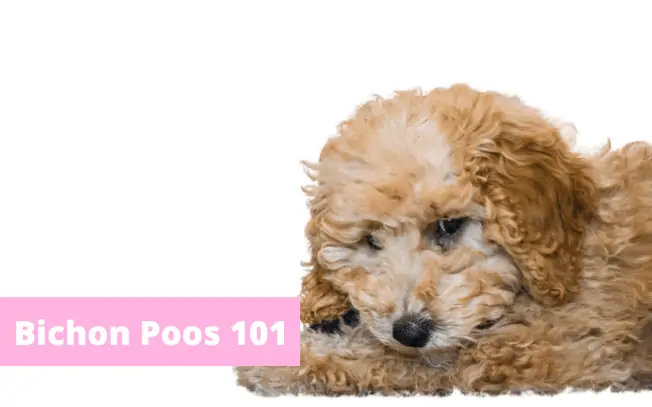Last Updated on
Ever wondered what the crossbreed between a Toy Poodle and Bichon Frise will look like?
If you’re picturing a tiny teddy bear with curly locks, you’re absolutely right. The Bichon Poo is one of the most popular crossbred Poodle breeds at the moment. But as I was doing research into this breed I realized something interesting: Bichonpoos are likely one of the noblest dogs around and I’ll discuss why later on.
But for now, let’s learn a little bit about the Bichonpoo and why you’ll likely want to add one of these adorable pups to your family.
Bichon Frise Poodle Mix: Characteristics
| Lifespan | 12 to 17 years |
| Height | 9 to 15 inches |
| Weight | 6 to 18 pounds |
| Coat | Curly/wavy coat |
| Colors | White, brown, cream, tan, black, grey, white, golden, and apricot |
| Temperament | Happy, loving, social, loyal, and docile |
| Price | $1,500 to $3,000 |
What is a Bichonpoo?
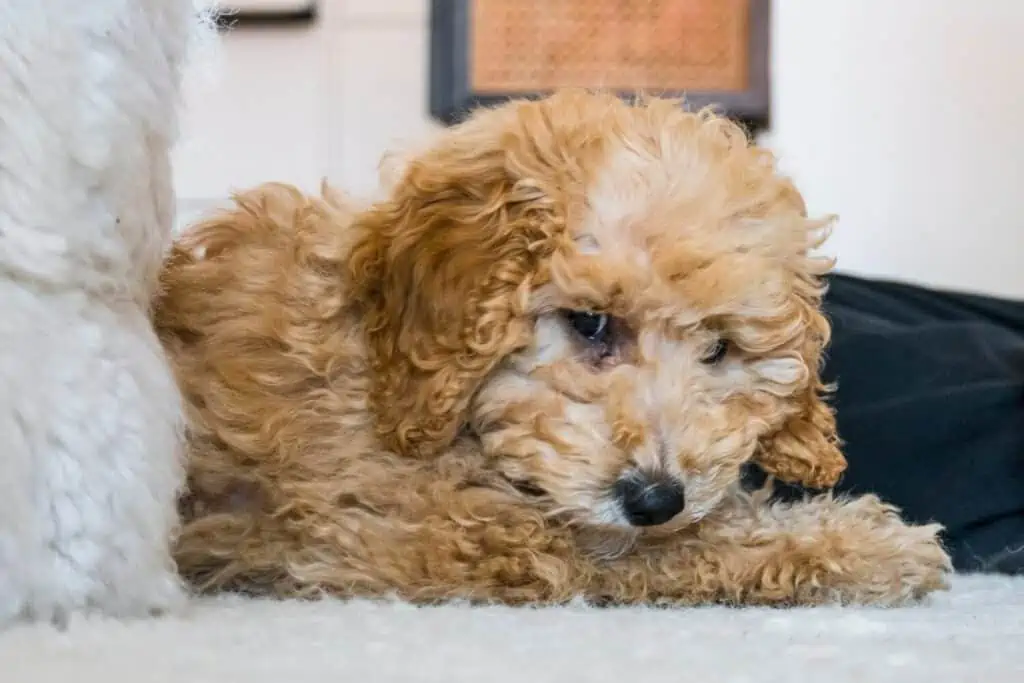
A Bichonpoo—also known as Bichpoo or Poochon—is a mix between a Mini/Toy Poodle and a Bichon Frise. Some people refer to them as ‘designer dogs’, which is just a fancy name for a mixed breed.
Besides having a super-adorable face, these cute pooches are intelligent and shed very little. And they’re quite spunky, making them fun for active families.
Having this little puppy around will always be fun, and you’ll never get bored playing with them.
Bichonpoo Temperament
Bichonpoos inherit qualities from both parent breed dogs. Let’s take a quick look at the features of the Bichon Frise and Toy Poodle to understand better what a Bichonpoo will be like.
(And as I promised, in the sections below, we’ll discuss why the Bichonpoo belongs to royalty).
Bichon Frise
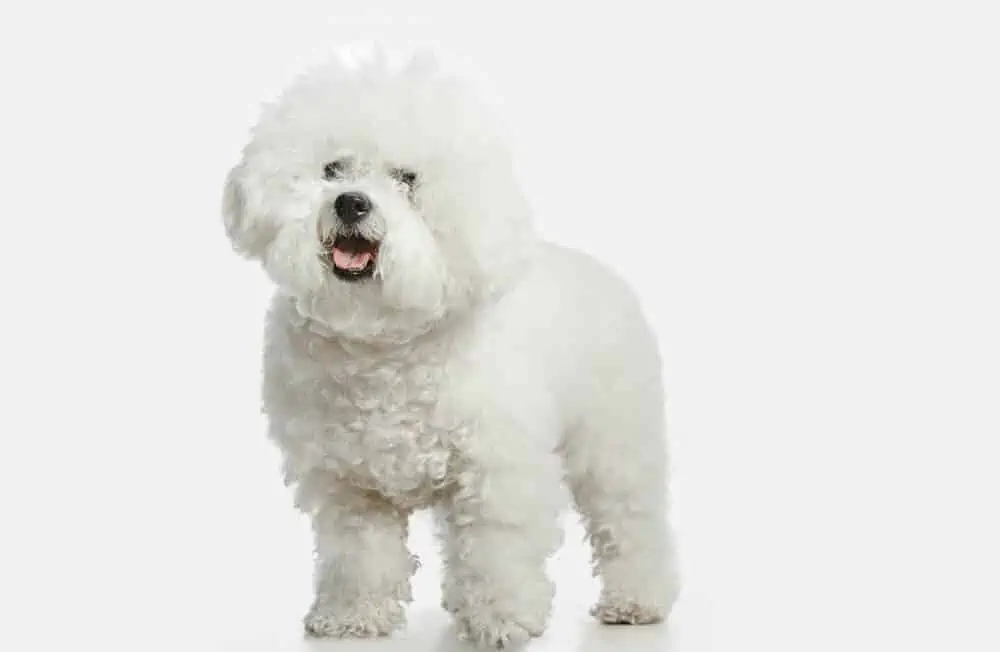
One of the first dogs I fostered was a Bichon Frise. He was a bubbly pup named Duke who loved chasing rabbits and spending time with his foster family. After fostering him for a short time, my parents insisted on adopting him.
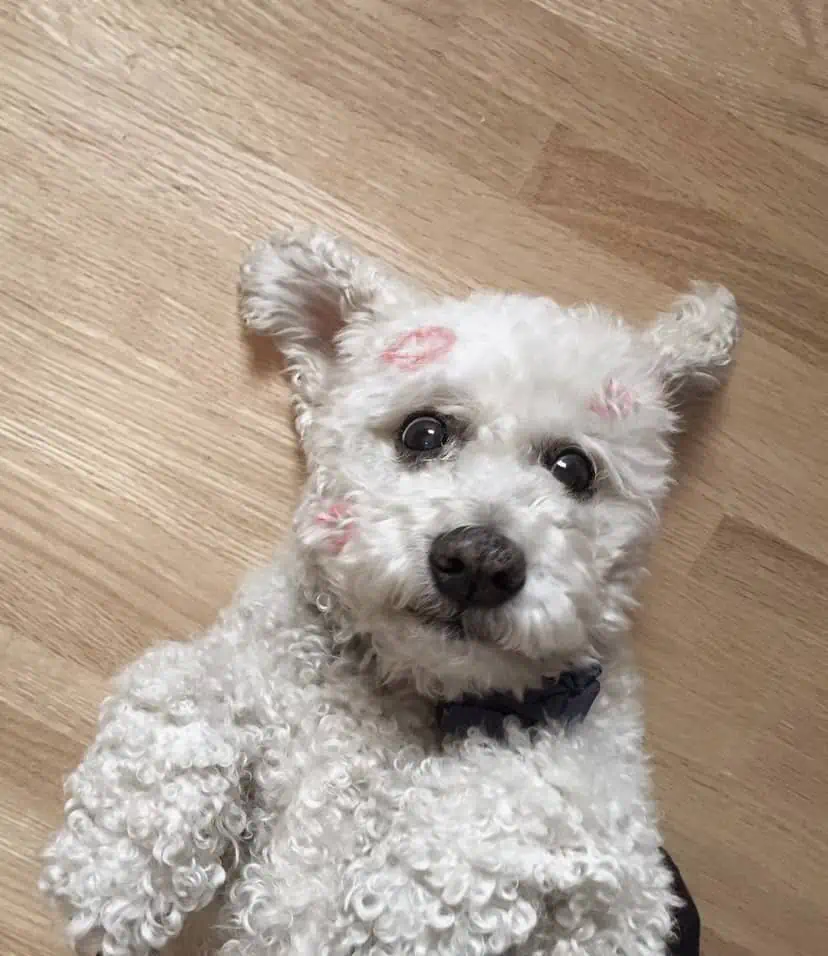
After adopting him, I began researching Bichon Frise and was surprised to learn that their roots traced back to the aristocratic class. These dogs even enjoyed a brief tenure as a coveted lap dog for royalty. This charming breed is a descendant of the Bichon Tenerife and is a member of the Barbichon family.
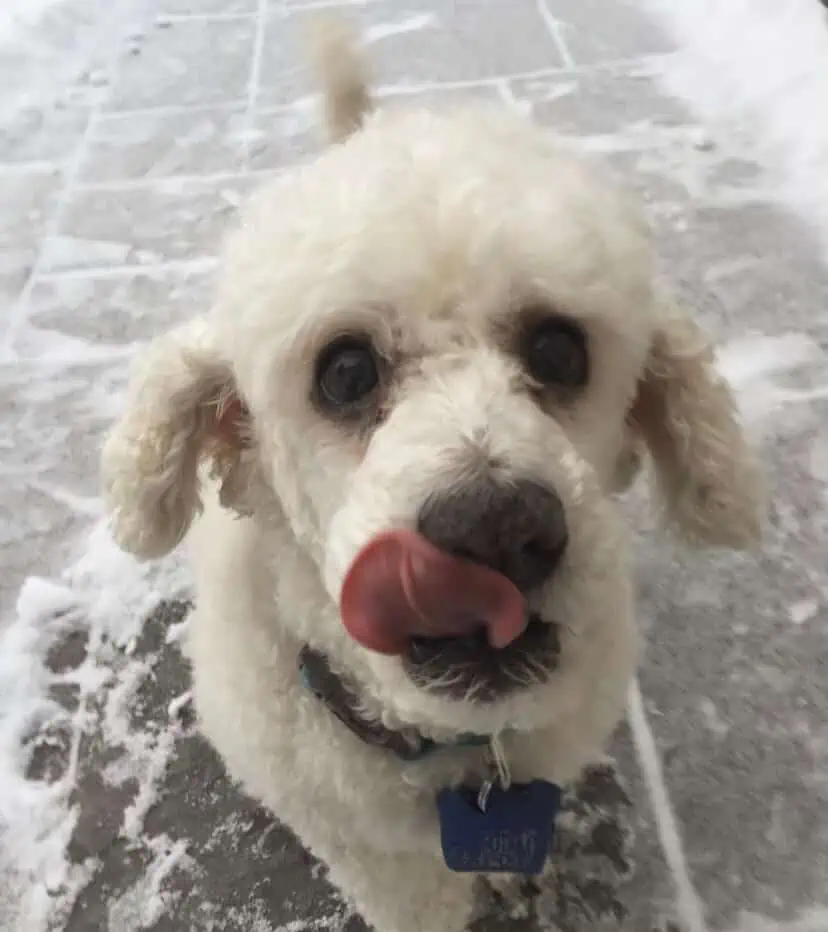
People love this breed because of their peppy behavior, playfulness, and energetic disposition. Bichon Frises have been known as great family dogs since the 13th century.
One thing to note about Bichon Frise is they aren’t the sharpest tool in the shed, but they sure make up for it by being cute as a button.
Poodles
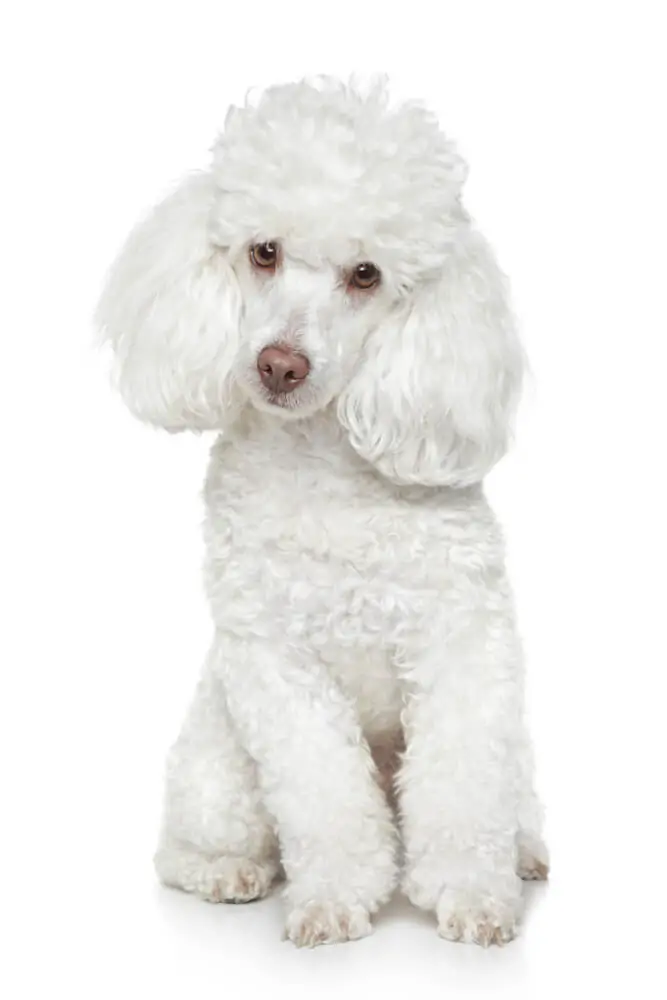
Poodles, on the other hand, are one of the smartest dog breeds in the world. Growing up, I had a Toy Poodle who was smart as a whip. With her springy Poodle legs, she’d jump and run and was the best playmate I could ask for.
Poodles come in miniature, standard, and toy sizes, but Bichon Poos are strictly bred with Miniature or Toy Poodles. Like the Bichon Frise, Poodles have curly, non-shedding coats.
As for their royal roots, Poodles became incredibly popular with royalty in France, particularly with King Louis XVI, who was known to have multiple Toy Poodles.
Bichonpoo
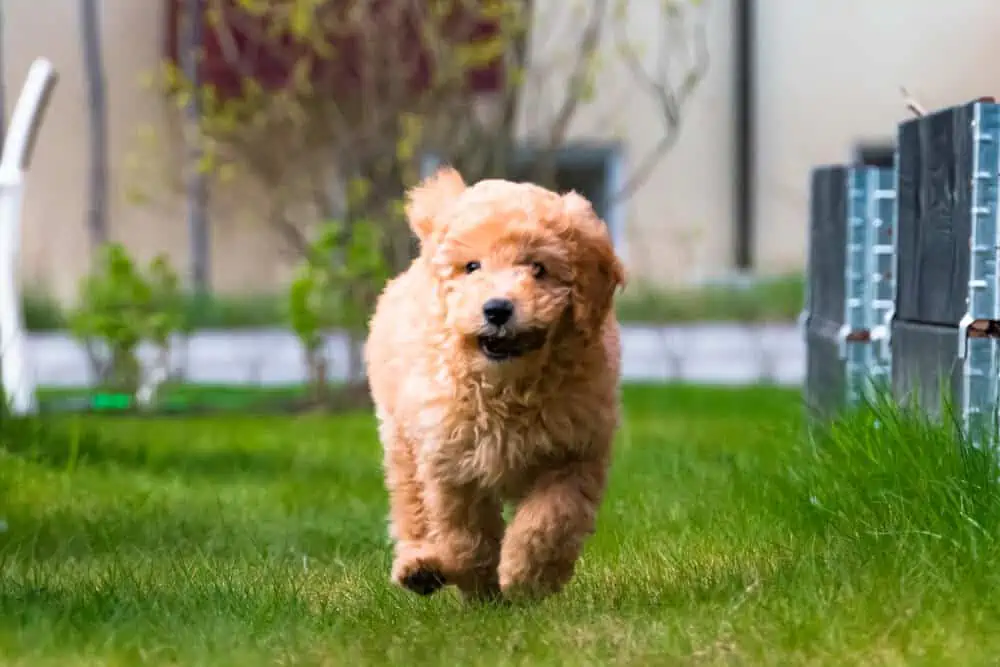
Considering that the Bichon Frise and Toy Poodle were adored by royalty, combining these two breeds results in quite the noble dog!
Let’s dive into the Bichon Frise Poodle mix and learn more about this pup’s temperament.
Energetic
This little guy is super energetic, just like its Poodle parent. They love to play around and need an active family to satisfy their playfulness.
Bichonpoos are an excellent choice for people who are looking for an active and energetic companion. These dogs are incredibly playful and love running, jumping, and exploring. They have a lot of energy and require regular exercise and plenty of mental stimulation to stay happy and healthy. Taking them for walks, playing fetch, and engaging in interactive playtime is a great way to keep them entertained and happy.
Bichon poodle puppies are best for families who can commit to at least a couple of hours of playing. The good thing about the Bichonpoo is its size—if you don’t have a big yard you can play plenty of indoor games to keep your Bichonpoo happy.
That being said, if you can’t provide enough exercise for this high-energy pup, you shouldn’t get a Bichonpoo.
Social
Bichonpoos are very social dogs and they thrive on human attention. If they are left alone for extended periods of time, they may develop separation anxiety. Keep this in mind, as you can do plenty of training exercises to prevent separation anxiety.
Overall, Bichonpoos are wonderful pets that are perfect for families, couples, or single people who are looking for an active and affectionate companion.
Alert
Despite their size, Bichonpoos make good guard dogs, and will always alert you when someone is near your house.
Otherwise, they are gentle, patient, and docile, making them the perfect dog around kids and other animals.
Friendly
Bichonpoos are social butterflies who love making new friends. They have a friendly and approachable demeanor, which makes socializing them as puppies a breeze.
You can expect your Bichonpoo to wag its tail and sniff around whenever it comes across another dog or person. Whether you’re out for a walk or simply running errands, your Bichonpoo will always be ready to make new friends and have a good time.
Intelligent
Bichonpoos are highly intelligent dogs that have a strong desire to learn and explore. They inherit their intelligence from their Poodle parent, rather than their Bichon Frise parent.
These dogs are quick learners and respond well to positive reinforcement training methods, such as praise, treats, and toys. This makes them a joy to train and a pleasure to have around.
Training is also an excellent way to bond with your Bichonpoo, and it provides them with the mental stimulation they need to stay sharp and focused.
They are super active and sense when strangers are nearing, which is why many dog keepers also prefer them as watchdogs.
Appearance
Height + Weight
With two small parents, you can expect your Bichonpoo to also be pint-sized. Generally, a male Bichon Frise Poodle mix will grow 11 to 15 inches tall and weigh around 10 to 18 pounds. Females are slightly smaller and grow 9 to 11 inches tall and weigh approximately 6 to 12 pounds.
These small dogs are great for small apartments, too, because they don’t need much space.
Color
Bichonpoos come in a variety of colors, including black, white, apricot, fawn, brown, cream, gray, and silver.
The most popular shades are black, apricot, and white, but the color of your Bichonpoo will largely depend on its parents, so it’s best to speak with your breeder to find out what to expect. Keep in mind that breeders can never predict the color of their litter with 100% certainty, and anyone who claims they can, is likely not a good breeder to buy puppies from.
Coat
Bichonpoos are known for their adorable teddy-bear appearance, thanks to their curly and wavy coat.
Additionally, being that both their parents are small low-shedding dogs, the Bichonpoo also inherits that low-shedding coat, making them an option for people with mild allergies.
However, it’s important to note that not all people with dog allergies will be able to tolerate this breed, so it’s best to consider your level of sensitivity before making a decision. And to speak with an allergist.
Dog allergies result from the protein found in the
They shed relatively less compared to other breeds, so you won’t have to worry about dog hair all over your house.
Since they don’t shed, they require frequent trips to the groomers and at-home grooming sessions to keep their coats beautiful and tangle-free!
Living Requirements
Bichonpoos are highly adaptable dogs that can fit into most living conditions without much trouble. Due to their small size, they don’t require a lot of space, making them ideal for apartment living or small homes.
Due to their gentle nature, Bichonpoos get along great with children and other animals, and if socialized properly, you don’t need to worry about your Bichonpoo becoming territorial or aggressive towards other members of your family.
Exercise
As mentioned earlier, Bichonpoos are active dogs who need at least a couple of hours of exercise every day. You can go for two short walks or one long one to keep them (and yourself!) active.
In addition to walks, make sure to set aside some time for playtime. You can stick with classic games like fetch or frisbee or switch things up with a game of hide and seek for some mental stimulation.
Not only will regular exercise keep your Bichonpoo happy and healthy, but it will also reduce the risk of diseases by keeping them in tip-top shape.
Training
Being part Poodle, Bichonpoos are easy to train. With their intelligence, they pick up tricks and commands relatively fast and respond well to positive training methods where they get treats and praise.
Training also includes socialization. Introducing your Bichonpoo puppy to plenty of new experiences when they’re young will build up confidence and help them become a well-rounded dog.
Grooming
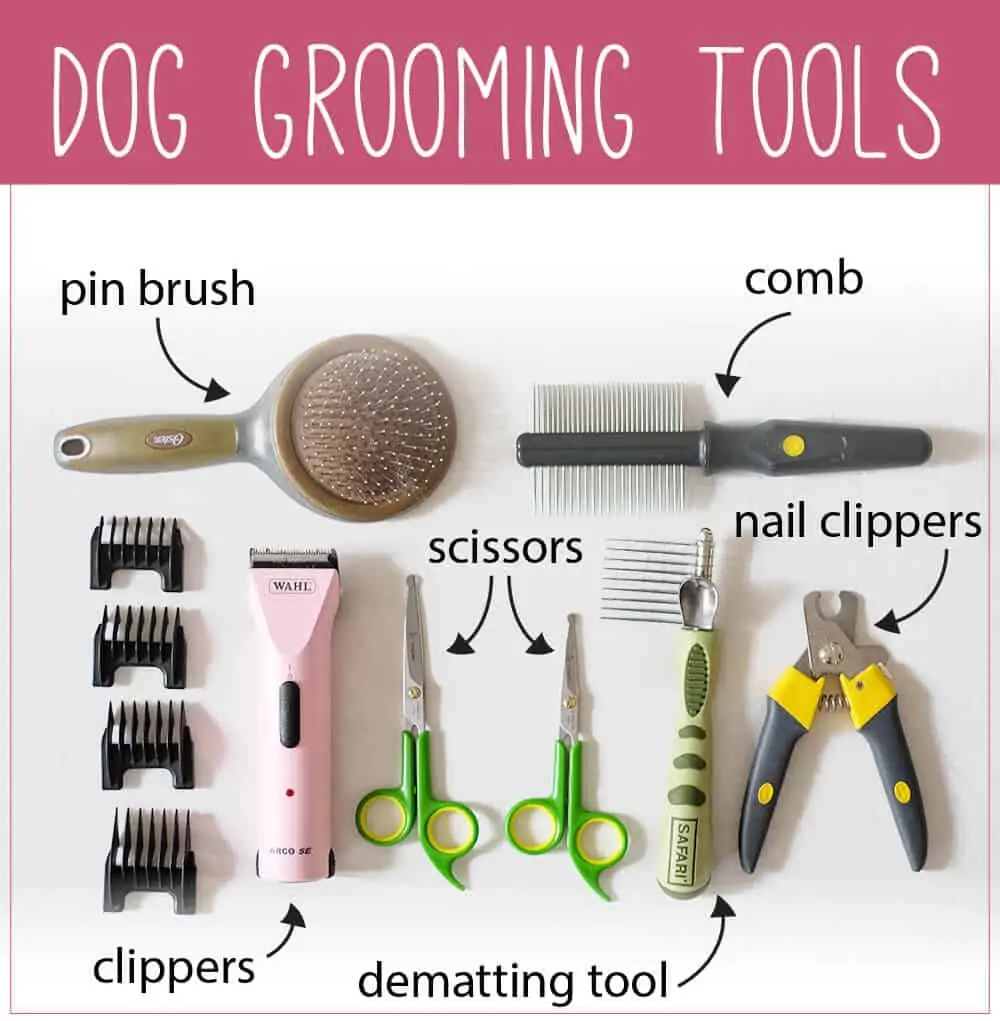
Because Bichonpoos are low-shedding dogs, they require daily brushing to prevent tangles, mats, and infections.
For best results, use a slicker brush with wire bristles and a steel tooth comb. The slicker brush is gentle on their skin and easily removes any tangles from their coat. Additionally, the steel tooth comb ensures you get all the tangles out, even ones at the base of their hair near the skin.
Although Bichonpoos don’t need frequent baths, it’s still a good idea to give them a good bath once every 4 to 5 weeks to remove dirt and debris from their hair.
Good dental hygiene is also important for your Bichonpoo as well. Toy Poodles are known for teeth issues, and the Bichonpoo can certainly inherit dental problems as well. Clean their teeth regularly using a soft-bristle toothbrush (a baby toothbrush works great) to prevent any build-up of bacteria.
Finally, plan to take your Bichonpoo to a professional groomer every 6 to 8 weeks. Their coat grows quickly, and regular trims are necessary to keep it looking neat and tidy.
Health Concerns
Mixed breeds like the Poodle Bichon cross are less prone to disease than purebred dogs. In turn, these dogs have fewer health issues and their lifespan is slightly longer.
But sometimes, a Bichonpoo may inherit some health issues from its parents. For example, from the Poodle parent, it may be predisposed to Progressive Retinal Atrophy and other eye issues.
From the Bichon Frise parent, the dog may get Patella Luxation. Under this condition, the kneecap does not form properly, leading to dislocation and ultimately causing severe pain.
This condition requires immediate medical treatment because, if delayed, it will require surgery.
Another common disease your Bichon Frise poodle mix may get is hip dysplasia. This also causes extreme pain and lameness.
To prevent these conditions, take your pup to the vet for regular checkups and ensure all the vaccinations are done on time.
You should also get a Bichonpoo from a reputable breeder and ask for health testing from both parents.
Cost of Bichonpoo Puppies
Getting a Bichon Poodle from a reputable breeder will cost you anywhere around $1,500 to $3,000.
If you are a Bichon Poodle fan but don’t want to spend too much on a puppy, you can look for rescue or adoption centers, specifically looking toward Doodle rescues. Often, Poodle mix dogs end up in rescues and you might get lucky by spotting a Bichonpoo who needs a loving home.
So, Should You Get Yourself A Bichon Poo?
Bichonpoos are charming, lively, and loving dogs that will bring you great joy and happiness. Just be sure to give them the attention, exercise, and training they need to stay healthy and happy, and you’ll have a faithful and devoted friend for years to come.
However, if you aren’t prepared for all that grooming and the exercise needs of a Bichonpoo, you might want to consider getting a breed with lower energy levels and less intensive coats.
This article may include affiliate links. www.travellingwithadog.com is a participant of Amazon.com Services LLC Associates Program. As an Amazon Associate, I earn a commission from qualifying purchase. www.travellingwithadog.com participates in other affiliate programs, and recieves commissions when purchases are made through the links. The cost is not inflated to account for the commission earned.
Veterinary Disclaimer: travellingwithadog.com is not a substitute for veterinary advice and does not intend to provide any type of veterinary advice for your animals. Please consult your vet for any questions you have regarding your pets health.

About the Author:
Dana owns a Sheepadoodle and a rescue merle Labradoodle. Her first dog growing up was a white Toy Poodle and she’s loved dogs ever since. She has years of experience fostering dogs and has helped find homes for a variety of different breeds, both large and small! After seeing so many dogs end up unwanted and in shelters, she began blogging about different dog breeds (specifically Doodle dogs, since that’s what she knows best) to help people make informed choices when adding a new member to their family.
When Dana’s not brushing her Doodles’ hair (it takes a lot of time for two!) you can find her playing nose work games and fetch with her two amazing pups.
Learn more about her here.

